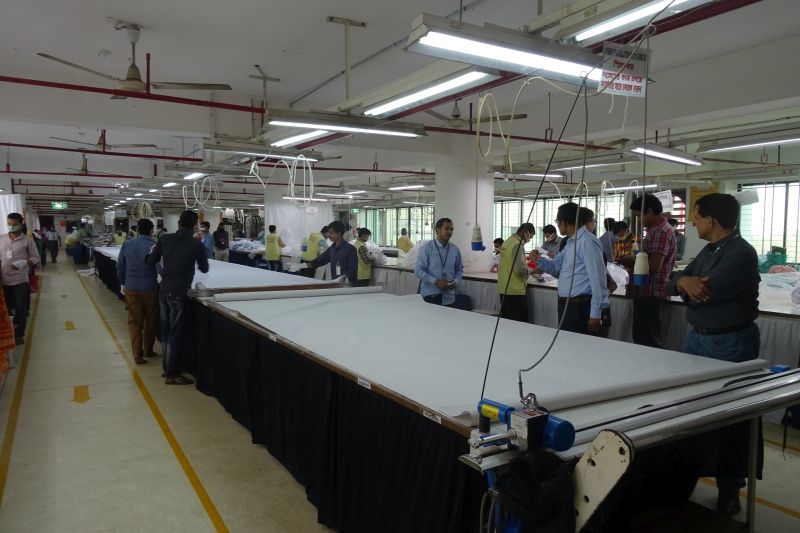Sustainable supply chains
“The law would be gutted before it even came into force”

It was supposed to be an important step for greater international accountability: in May 2024, the European Union passed the “Corporate Sustainability Due Diligence Directive”, or the EU Supply Chain Act for short. In future, European companies would have to assume more responsibility for how their products and their components are manufactured internationally – and under what working conditions. But even after its passage, the law is sparking debate. In early April 2025, its introduction was postponed by a year in order to allow time for further changes.
Mr. Paasch, you wrote an article for D+C in 2024 about how important the EU Supply Chain Act is – and warned that it could be weakened. Now the EU Commission is in fact planning to make significant changes before the law is even in force. What exactly is being amended?
On 26 February, the Commission suggested in the new so-called Omnibus proposal that key parts of the directive be weakened. The due diligence requirements will now only apply to subsidiaries and direct suppliers, which are typically located in the EU and pose the lowest risk to human rights. European companies will only have to concern themselves with indirect business partners if they have plausible evidence of human rights or environmental problems. But by then it is usually too late.
That means that the law will not be applied where it is needed most?
Exactly. Most harm occurs at the beginning of the supply chain, like in mines or on plantations in the Global South. It is precisely these risk areas that would now be excluded. Moreover, the Commission wants to eliminate the civil liability provision. That means that people in countries of the Global South will have little hope of obtaining compensation if European companies cause damage by violating due diligence requirements. At the same time, penalties for violations will no longer be tied to corporate revenue as originally planned. Thus it will be significantly cheaper and therefore even easier for large companies to simply write off fines as “operating expenses” instead of actually changing their practices. The law’s climate change provisions are also being weakened: Although companies would still have to draw up plans to adhere to the 1.5-degree goal of the Paris Agreement, they would no longer be required to implement them. The law would be gutted before it even came into force.
What would all that mean for people in countries of the Global South?
It would mean that people suffering under poor working conditions would have even fewer opportunities to protect themselves. European companies would have to take hardly any responsibility.
What could the Supply Chain Act achieve in its current form: Could it truly change conditions or only make it easier to obtain compensation?
A good example is the catastrophic fire in the Ali Enterprises textile factory in Pakistan in 2012. Over 250 people died because emergency exits were blocked and there were no fire safety measures in place. The factory’s biggest client was KiK, the German discount textile retailer. The families of the victims tried to sue for damages in Germany, but were denied because of the short statute of limitations under Pakistani law. And because European clients have so little accountability, their chances of success would have been very low. The EU Supply Chain Act would require companies to, for example, investigate and address fire safety risks. Such measures could have prevented or contained the catastrophe. And when these measures are not implemented and human rights violations or damages occur, victims or their families could sue in civil courts in EU member states. That is the main advantage of the EU directive compared to the German Supply Chain Due Diligence Act, which has no civil liability provision.
So it’s not just about compensation, but above all prevention?
Exactly. If companies knew that they could be held liable in European courts, they would have a clear incentive to create better working conditions and not just react when it is too late. But if the new plans restrict the due diligence requirement to direct suppliers, precisely the opposite will happen. In the worst case scenario, companies would even have an incentive to ignore evidence that would require them to take preventive measures.
The main reason that is usually given for weakening the law is that it would create more bureaucracy.
To my mind, this discourse is unfortunately clearly being fueled by trade associations and intentionally exaggerated. Of course implementing laws creates bureaucracy. This kind of thing cannot be done without reporting. Company reports are important because they allow authorities and civil society to examine their work. But they are not the “bureaucracy monster” that large trade associations in Germany claim they are. The due diligence requirements would only apply anyway to very large companies with over 1000 employees and annual sales of € 450 million. If you look at the only available representative survey in Germany, you will see that only seven per cent of German companies reject legal due diligence requirements. Eighty per cent report that they are already fully or partially implementing them. There is absolutely no empirical evidence for the EU Commission’s assertion that the Supply Chain Act and other sustainability regulations would endanger the competitiveness of European companies.
That survey focuses above all on the German Supply Chain Due Diligence Act, which has been introduced in stages since 2023. What role is Germany now playing in the reformulation of the EU Supply Chain Act?
In order for the Omnibus proposal to be adopted, it has to be approved by a qualified majority in the EU Council, or, in other words, by two-thirds of governments with two-thirds of the population. That is a high barrier. The French and Spanish governments, for example, are vocally opposed to eliminating the civil liability provision. The acting German government has also expressed reservations. It remains to be seen how the future German government will position itself. In their coalition agreement, the Christian Democratic bloc (CDU/CSU) and the Social Democrats (SPD) announced that they would replace the German Supply Chain Due Diligence Act with a new law that would implement the EU Supply Chain Act in a “low-bureaucracy” and “enforcement-friendly” manner. At the same time, they support the “Omnibus procedure” and want to avoid “over-regulation”. What exactly this means, however, remains unclear and will have to be negotiated between the two parties. In the European Parliament, Social Democrats and Greens are fighting efforts to weaken the Supply Chain Act, even though they also voted on 3 April 2025 to postpone its application by a year. In the run-up to this vote, the European People’s Party – the largest party in the current European Commission with a Christian Democratic, conservative stance – promised to seek a compromise with Social Democrats, Greens and Liberals regarding substantive changes to the law instead of entering into a pact with far-right factions. We can only hope that this “firewall” will hold and that the efficacy of the Supply Chain Act will not be restricted.
LINK
Verband der Vereine Creditreform e. V., Handelsblatt Research Institute, 2024 (in German): Sorgfaltspflichten in der Lieferkette – Wo steht die deutsche Wirtschaft? https://research.handelsblatt.com/wp-content/uploads/2024/10/2024_HRI_Creditreform_LKSP.pdf
Armin Paasch is an expert on responsible business practices and human rights at Misereor, a Catholic development agency.
armin.paasch@misereor.de











